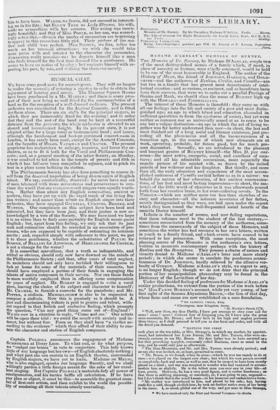MUSICAL CHAT.
WE have some good news for concert-goers. They will no longer be under the necessity of entering a pigstye in order to obtain the enjoyment of hearing good music. The Hanover Square Rooms have been purchased by a Mr. MARTIN; and there is every pros- pect of their now being as well fitted for the accommodation of a band as for the reception of a well-dressed audience. The present orchestra was constructed for the Ancient Concerts, and is fitted for them alone. There are six stalls for the principal singers, in which they are immoveably fixed for the evening; and in order that they and the rest of the band may be kept at a respectful distance from the preserve, the whole orchestra is elevated to an absurd and inconvenient height. In its present state, it is not adapted either fbr a large vocal or instrumental band ; and hence, although the handsomest and best-proportioned concert-room in London, it has rarely been used, except for the Ancient Concerts, and the benefits of Messrs. VAUGHAN and CRAMER. The present proprietor has undertaken to enlarge, improve, and lower the or- chestra, so as to fit it both for the Vocal and Philharmonic Con- certs; and, at a general meeting of the latter Society, on Monday, it was resolved to bid adieu to the temple of poverty and filth in which it has hitherto been compelled to sojourn, and to pitch its tent in a place more befitting its station.
The Philharmonic Society has also done something to rescue it- self from the deserved imputation of being discouragers of English talent. We say, emphatically, deserved; for never have any set of men laboured with more earnestness and perseverance to con- vince the world that our composers-an and singers were equally worth- less. Rather than admit any English composition, ancient or modern, they have put up with the vapid trash of the living Ita- lian writers ; and sooner than admit an English singer into their orchestra, they have engaged GIUBILEI, Cuntom, BEGREZ, and WINTER. Our complaints on this subject have been loud and reiterated, but they have been just, and their justice is now ac- knowledged by a vote of the Society. We may have (and we hope it is no crime thus to feel) some partiality for English music quasi English; but, apart from this feeling, we only ask that its just rank and estimation should be accorded in an association of pro- fessors, who are supposed to be capable of estimating its intrinsic merits : and, regarded simply with reference to this point, we put it to these gentlemen, whether the • substitution of PAC INI for BISHOP, of BELLINI for ATTWOOD, Of MERCADANTE for CROTCH, is not a change for the worse? It is somewhat marvellous, that a truth so indisputable, and withal so obvious, should only now have dawned on the minds of the Philharmonic Society ; and that, after years of total neglect, its members should not only have testified their willingness to look at home for some of the materials of their concerts, but should have employed a portion of their funds in engaging the talents of native composers in their service. Nor can those funds be more worthily employed than in offering some compensation for years of neglect. Mr. BISHOP is engaged to write a vocal piece, leaving the choice of its subject and character to himself; Mr. Cuss-ems, to furnish a concerto for the pianoforte; and Mr. POTTER, a sinfonia. MENDELSSOHN is also to be requested to compose a sinfonia. Now this is precisely as it should be. A just and discriminating tribute is paid to genius and talent, with- out regard to that foolish and exclusive feeling, which prompts the question, " Can any good thing come out of—England ?" We are now in a situation to reply, "Come and see." Our artists will be upon their trial : we await the result with anxiety and in- terest, but without fear. From us they shall have "a verdict ac- cording to the evidence " which they afford of their ability to sus- tain the character and station of English composers.


























 Previous page
Previous page